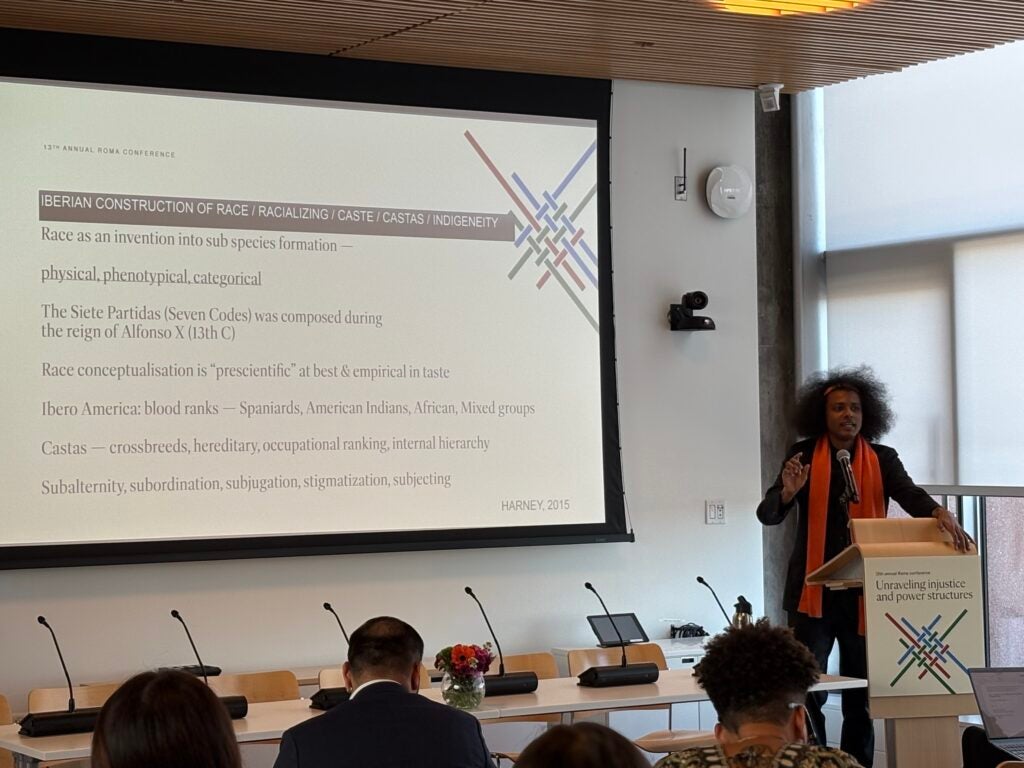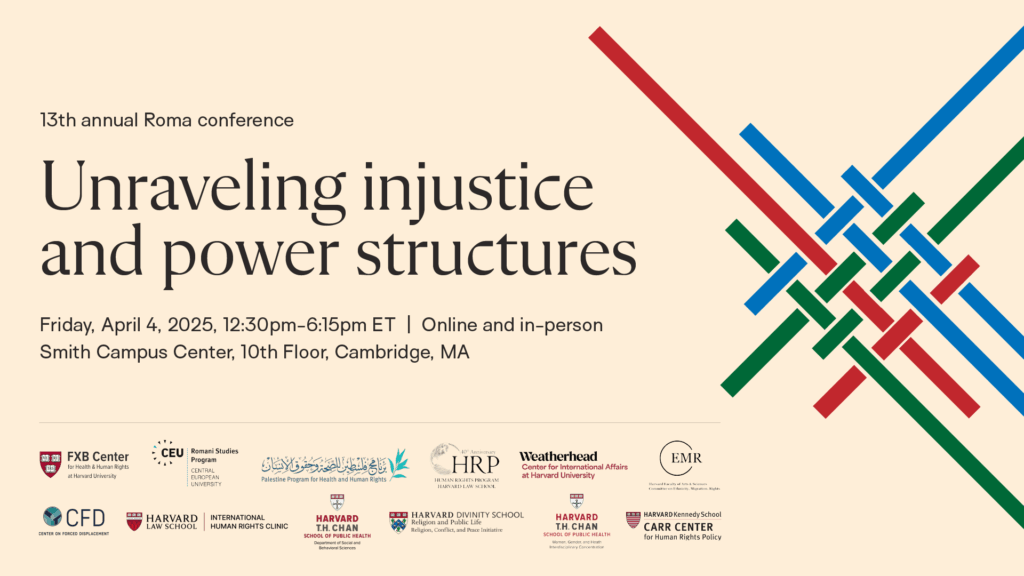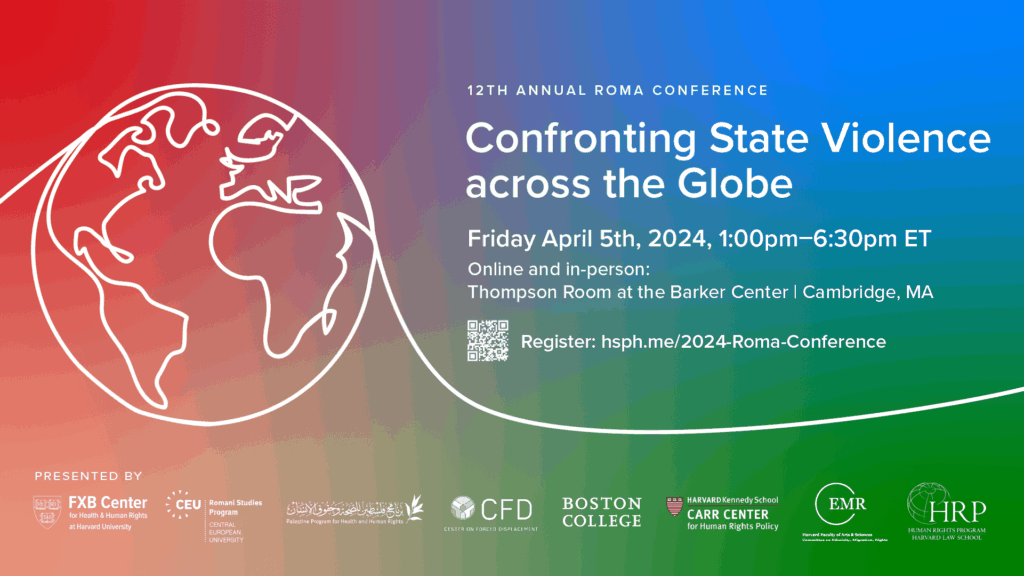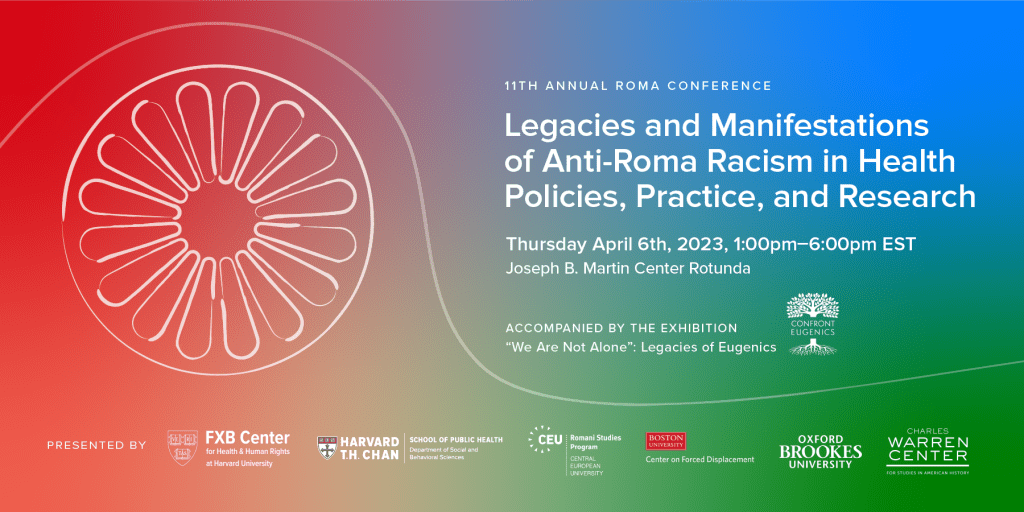Annual Roma Conferences

In partnership with the Romani Studies Program at Central European University, the Center on Forced Displacement at Boston University, the Department of Social and Behavioral Sciences Diversity, Inclusion, and Belonging Committee and the Women, Gender, and Health (WGH) Concentration and Working Group at the Harvard T.H. Chan School of Public Health, the Carr Center for Human Rights Policy at the Harvard Kennedy School, the Harvard University Committee on Ethnicity, Migration, Rights (EMR), the Weatherhead Center for International Affairs at Harvard University, the Religion, Conflict, and Peace Initiative at the Harvard Divinity School, the Palestine Program for Health and Human Rights, the International Human Rights Clinic at the Harvard Law School, and the Human Rights Program at Harvard Law School, the Roma Program for Health and Human Rights at the FXB Center for Health and Human Rights will host a free, hybrid format conference at Harvard University’s Smith Campus Center (10th Floor) on Friday, April 4, 2025.
Since 2013, the annual Roma conference at Harvard University has served as a forum to examine and address anti-Roma racism, its genesis, history, pillars, and manifestations worldwide. We have aimed to improve the collection of data related to the Roma people, enhance research methods, focus on action-oriented research, and revisit and inform the histories, policies, and practices concerning Roma people. Furthermore, the Harvard Roma conference has actively sought to elevate and co-center the voices and experiences of Roma people within global scholarship. It has fostered discussions on anti-racism, reparations, solidarity, and justice-oriented solutions and emphasized the importance of solidarity among historically oppressed communities.
In partnership with the Romani Studies Program at Central European University, the Palestine Program for Health and Human Rights, the Center on Forced Displacement at Boston University, the Center for Human Rights and International Justice, History and Music Departments at the Morrissey College of Arts and Sciences at Boston College, the Carr Center for Human Rights Policy at the Harvard Kennedy School, the Harvard University Committee on Ethnicity, Migration, Rights (EMR), and the Human Rights Program at Harvard Law School, the Roma Program at the FXB Center for Health and Human Rights hosted a free, hybrid format conference at Harvard University’s Barker Center (110 Thompson Room) on Friday, April 5, 2024.
The annual Roma conference at Harvard has been established as a forum for presenting research and discussion concerning anti-Roma racism, its genesis, history, pillars, and manifestations. It seeks to advance the collection of Roma-related data and the improvement of research methods and practice-oriented research to inform the development of histories, policies, and practices centered on the Roma people. The Harvard Roma conference also seeks to place and co-center the Roma people in global conversations on anti-racism, justice-based policies and laws, and solidarity.
In partnership with the Department of Social and Behavioral Sciences, Harvard Chan School of Public Health, the Charles Warren Center for Studies in American History at Harvard University, the Romani Studies Program at Central European University, the Center on Forced Displacement at Boston University, and the Centre for Medical Humanities at Oxford Brookes University, the Roma Program at the FXB Center for Health and Human Rights hosted a free, in-person conference at Harvard University’s Martin Center. On April 8, 2023 we marked the 52nd anniversary of the First World Roma Congress. For more information about International Roma Day, click here.
Many sociological and anthropological studies document disparities in health outcomes for Roma people and their non-Roma neighbors. Scholars often propose social and economic factors, cultural differences, behaviors, and “lifestyle” as causes of disease and inequities. But comprehensive scholarship on how structural racism has shaped Roma’s health and health inequities between Roma and non-Roma is scarce. Little has been done to understand the historical underpinnings of inequities and the legacies of slavery, G*psy hunts, forced imprisonment, genocides, or forced assimilation. For instance, a significant number of Roma families and communities across Europe live in poorly resourced and residentially segregated neighborhoods, a legacy of both past and present anti-Roma measures. Yet, only a few studies, such as the 2022 Enhojust report, have documented the nexus between residential segregation, environmental racism, and poor health outcomes.
In light of such shortcomings, the Roma Program is launching an initiative that focuses on documenting structural anti-Roma racism and its health-related impacts in Europe and other parts of the globe. The goal is to build a robust knowledge base and fill gaps in content and research methodology while ensuring that the efforts undertaken are responsive to community needs and inform policymaking. Accordingly, this annual Roma conference aimed to initiate a series of conversations and research efforts on anti-Roma racism as a structural determinant of health inequalities and as a health stressor in itself in order to improve data, research methods, and practice-oriented research and inform policy design.
Questions that were addressed during the conference included:
- How do we assess and address the impact of anti-Roma racism on the health and well-being of the Roma people?
- Can we use or adjust existing theories (e.g., the ecosocial theory of disease distribution) and measures (e.g., everyday discrimination scale ) to probe a potential causal relationship between structural anti-Roma racism and health inequities?
- How do we catalog, measure, and quantify the acute, chronic, and traumatic dimensions of anti-Roma racism?
- How do we prevent and combat the use of cultural determinism in justifying or explaining health inequities and negative health outcomes?
- How do we combat the eugenic de-humanization of the Roma?
- How do we create a shared sense of solidarity in confronting racism in health at a global level?
The “We Are Not Alone”: Legacies of Eugenics exhibition on view at the Joseph B. Martin Conference Center during the 11th annual Roma Conference on April 6, 2023. Photos by Kent Dayton/Harvard Chan School:
Alone Together: Strength and Solidarity between the Roma and African American Communities (2018)
On April 4, 2018, Harvard FXB, in partnership with The Department of African and African American Studies at Harvard University, and the Harvard Kennedy School Office of Diversity and Inclusion, hosted Cornel West for a panel on the common struggle of the Roma and African American peoples. See the full discussion below.
Culture Beyond Borders: The Roma Contribution (2017)
The FXB Center for Health and Human Rights hosted the Fifth Annual Roma Conference at Harvard University, Culture Beyond Borders: The Roma Contribution, to mark International Roma Day. The event brought together academic, literary, artistic, and student communities to explore the contributions of the Roma community to global culture, arts, and material production.
The Harvard FXB Center started organizing an event to honor International Roma Day in 2013. In 2017, new emphasis was added to the discussion by documenting and contextualizing Roma creative and artistic achievement across a range of domains. Culture Beyond Borders debuted with “I Declare at My Own Risk,” Alina Șerban’s illuminating and highly acclaimed examination of conflicting identities, social discrimination, and the redemptive force of self-expression.
The conference was co-sponsored by the Berklee College of Music and the following departments and centers at Harvard University: The Center for European Studies, The Committee on Ethnicity, Migration, Rights, The Mahindra Humanities Center, The Department of Music, The Provost’s Fund for Interfaculty Collaboration, and the Weatherhead Center for International Affairs.
Read the FXB event announcement of the event here.
On April 8, 2016 on International Roma Day, Harvard FXB convened this conference as a way to raise awareness of the 500 years Roma people were held in slavery and the limited recognition of their history of oppression along with the absence of reparations for Roma slave descendants. Panelists from South Africa, Jamaica, France, Hungary, and Romania represented groups calling for reparations, such as Cherokee slave descendants, indigenous Maya K’iche women from Guatemala, the African American community in the United States, and the Romani people in Europe.
Scholars and activists addressed the legacy and the continuum of injustice, ending with a vision for how to build a culture of peace and social justice. The conference provided an opportunity to explore the issue of collective wrongs comparatively – across historic and geographic regions as well as across academic disciplines. It drew attention, in particular, to the lack of measures to atone for past wrongs committed by states against Roma populations.
Harvard FXB organized the conference in partnership with several Harvard departments and centers, the Mahindra Humanities Center; Carr Center for Human Rights Policy; Center for European Studies; Committee on Ethnicity, Migration, Rights; Harvard University Native American Program; Hutchins Center for African & African American Research; and the Harvard Seminar on History and Politics.
Watch videos from the conference on YouTube here.
See photos here.
Furthermore, Harvard FXB and the Mahindra Humanities Center at Harvard University joined forces with the Mediterranean Music Institute (MMI) at the Berklee College of Music to both address issues facing the Roma community in Europe and to celebrate Romani culture. MMI sponsored a concert of traditional Romani folk music at the Berklee Performance Center during which Berklee students performed with guest artist Damian Draghici ’98, a legendary Romanian pan flutist and member of the European Parliament.
The concert was divided into two parts: In the first part, a student band performed Roma Gypsy songs composed by Romanian student Tomás Kaco followed by Gypsy songs from Spain and the Balkans arranged by Spanish student violinist Tania Mesa. In the second part of the concert, Damian Draghici performed gypsy Roma repertoire with the students.
For more on the concert: https://college.berklee.edu/news/slideshow-roma-berklee-night
Additional resources:
This annual Roma event at Harvard was a joint effort of Harvard’s FXB Center and Center for European Studies in recognition of the International Roma Day on April 8. It featured a discussion between Damian Drăghici, Romani Member of the European Parliament, and Margareta Matache, Instructor at Harvard’s FXB Center.
We welcomed Damian Drăghici’s participation, a renowned musician and Roma member of the European Parliament, for a set of robust, critical conversations assessing Europe’s track record in addressing anti-Roma discrimination so far.
Additional information here.
The event took place on October 28, 2014, and was jointly organized by the Harvard University Native American Program; Francois-Xavier Bagnoud Center for Health and Human Rights, Harvard School of Public Health; Human Rights Program, Harvard Law School; Hutchins Center for African and African American Studies.
The core objective of this event was to reflect on the different forms of discrimination encountered by minority/marginalized children in schools in modern US and Europe, sixty years after the ruling of the historic case, Brown v. Board of Education.
The discussion reflected on cross-cutting causes and common concerns of marginalization across continents, with a focus on school segregation. It discussed the paths of segregating minority and/or indigenous children in schools and the impacts for children, families, peers and society.
Scholars and practitioners representing minority/marginalized groups were invited to advance their analyses on the roots and factors that push discrimination in education and move ahead toward inter-sectorial partnerships.
Poster event here.
In collaboration with a number of departments and centers across the university, we continued to host Harvard’s annual conference marking International Roma Day on April 8, 2014. This event centered on school segregation and featured a special screening of “Our School,” a film following three Roma children in rural Transylvania, all three of whom were participants in a pilot program on school desegregation.
Known as the first Roma conference at Harvard, the “Realizing Roma rights: addressing violence, discrimination and segregation in Europe” conference was organized on April 8, 2013 by the FXB Center for Health and Human Rights, the Mahindra Humanities Center, the Center for European Studies at Harvard University and the OSCE/ODIHR/Contact Point for Roma and Sinti Issues.
The conference convened international experts from government, civil society and the academy and an overflow and diverse audience. The discussions involved several well-known academics: Grzegorz Ekiert, Jack Greenberg, Will Guy, Michele Lamont, Kalman Mizsei, Amartya Sen; leading Roma activists and scholars: Dezideriu Gergely, Marian Mandache, Oana Mihalache, Anna Mirga, Iliana Sarafian; and representatives of US and international government institutions: Roberta V. Gatti, Morten Kjaerum, Andrzej Mirga, Erika Schlager, Michael Uyehara.
The goal of the conference was to place the realization of Roma rights on academic and policy agendas in the United States and Europe and to generate dialogue on the role of Roma youth in promoting Roma economic, social and political inclusion. The participants addressed two of the most urgent challenges facing the Roma community in Europe: 1) the escalating climate of anti-Roma violence, extremism, and structural discrimination, and 2) the need to strengthen Roma youth agency and leadership.
The Nobel prize laureate, Amartya Sen contributed to the conversation by providing insights on how ethnic groups, such as Roma, can build their social and cultural capital, in unwelcoming though economically developed environments and shift dominant historical and contemporary views on the Roma and to address the invisibility of Roma issues in social and political theory.
The event concluded with a reception and an exceptional performance by Lulo Reinhardt, a musician born in a Roma family with a legendary and famous music tradition.
Additional information:
Videos of all panels are available on the FXB Center’s YouTube channel.
Publications
Published by the University of Pennsylvania Press in March 2017, Realizing Roma Rights inquires, from the standpoint of a range of different disciplinary and professional perspectives, why the Roma minority continues to face issues of discrimination and stigmatization, and concomitant deprivations across a range of central socio-economic indicators, including education, child mortality, and poverty.
A primary goal of the book was to promote reflection on historical and contemporary Roma marginalization and to correct the invisibility of Roma issues in current social and political theory. Another goal of the book was to contextualize Roma policy formulation and its implementation within a broader governance and accountability discourse.
Read reviews of the book:
Read the FXB announcement here.




